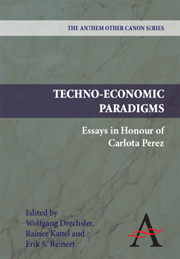Book contents
- Frontmatter
- Contents
- Preface
- Techno-Economic Paradigms
- 1 Introduction: Carlota Perez and Evolutionary Economics
- 2 Developing Innovation Capability: Meeting the Policy Challenge
- 3 Slow Food, Slow Growth … Slow ICT: The Vision of Ambient Intelligence
- 4 Technical Change and Structural Inequalities: Converging Approaches to Problems of Underdevelopment
- 5 The New Techno-Economic Paradigm and its Impact on Industrial Structure
- 6 Governance in and of Techno-Economic Paradigm Shifts: Considerations for and from the Nanotechnology Surge
- 7 Innovation Policy and Incentives Structure: Learning from the Mexican Case
- 8 Schumpeter's Business Cycles and Techno-Economic Paradigms
- 9 Asian Innovation Experiences and Latin American Visions: Exploiting Shifts in Techno-Economic Paradigms
- 10 Doing Capitalism: Notes on the Practice of Venture Capitalism (Revised and Extended)
- 11 Small States, Innovation and Techno-Economic Paradigms
- 12 Financial Experimentation, Technological Paradigm Revolutions and Financial Crises
- 13 Why the New Economy is a Learning Economy
- 14 The Art of Macro-Qualitative Modelling: An Exploration of Perez' Sequence Model of Great Surges
- 15 Technology, Institutions and Economic Development
- 16 Techno-Economic Paradigms and the Migration (Relocation) of Industries to the Peripheries
- 17 On the Discreet Charm of the (Rentier) Bourgeoisie: The Contradictory Nature of the Installation Period of a New Techno-Economic Paradigm
- 18 Production-Based Economic Theory and the Stages of Economic Development: From Tacitus to Carlota Perez
- 19 Carlota Perez' Contribution to the Research Programme in Public Management: Understanding and Managing the Process of Creative Destruction in Public Institutions and Organizations
- 20 Carlota Perez – Her Biography and the Origins of her Ideas
- Notes
- Bibliography Carlota Perez
19 - Carlota Perez' Contribution to the Research Programme in Public Management: Understanding and Managing the Process of Creative Destruction in Public Institutions and Organizations
Published online by Cambridge University Press: 05 March 2012
- Frontmatter
- Contents
- Preface
- Techno-Economic Paradigms
- 1 Introduction: Carlota Perez and Evolutionary Economics
- 2 Developing Innovation Capability: Meeting the Policy Challenge
- 3 Slow Food, Slow Growth … Slow ICT: The Vision of Ambient Intelligence
- 4 Technical Change and Structural Inequalities: Converging Approaches to Problems of Underdevelopment
- 5 The New Techno-Economic Paradigm and its Impact on Industrial Structure
- 6 Governance in and of Techno-Economic Paradigm Shifts: Considerations for and from the Nanotechnology Surge
- 7 Innovation Policy and Incentives Structure: Learning from the Mexican Case
- 8 Schumpeter's Business Cycles and Techno-Economic Paradigms
- 9 Asian Innovation Experiences and Latin American Visions: Exploiting Shifts in Techno-Economic Paradigms
- 10 Doing Capitalism: Notes on the Practice of Venture Capitalism (Revised and Extended)
- 11 Small States, Innovation and Techno-Economic Paradigms
- 12 Financial Experimentation, Technological Paradigm Revolutions and Financial Crises
- 13 Why the New Economy is a Learning Economy
- 14 The Art of Macro-Qualitative Modelling: An Exploration of Perez' Sequence Model of Great Surges
- 15 Technology, Institutions and Economic Development
- 16 Techno-Economic Paradigms and the Migration (Relocation) of Industries to the Peripheries
- 17 On the Discreet Charm of the (Rentier) Bourgeoisie: The Contradictory Nature of the Installation Period of a New Techno-Economic Paradigm
- 18 Production-Based Economic Theory and the Stages of Economic Development: From Tacitus to Carlota Perez
- 19 Carlota Perez' Contribution to the Research Programme in Public Management: Understanding and Managing the Process of Creative Destruction in Public Institutions and Organizations
- 20 Carlota Perez – Her Biography and the Origins of her Ideas
- Notes
- Bibliography Carlota Perez
Summary
The publication of this book to crown the life and work of Carlota Perez in the service of research into technology cycles and their relationship with financial cycles comes at exactly the right time because, unfortunately, her analysis has proved to be absolutely right: about 30 years after the start of the fifth technology cycle based on information and communication technologies, the crisis is upon us. It is a global, systemic crisis similar to that of 1929, the one that separates the two phases of Kondratiev cycles (which do indeed always seem to last 50 to 60 years), even as those who waxed lyrical about the ‘new economy’ were predicting their disappearance. Carlota Perez steadfastly maintained in recent years that the dot-com bust in 2001 was not the ‘real’ crisis that, given the continuing split between the real and the virtual economy, was still to come. Her work helps give us a better understanding of the relationship between capitalism and society as a system based on disequilibrium, emphasizing the specific role of a financial capitalism that first fuels, then dampens, entrepreneurial ardour, this being the genuinely new anthropological model of capitalism as identified by Schumpeter.
The cyclical hypothesis having proved its worth, we can therefore look forward to a period of great turbulence, accompanied by social and political strife, if not war. October 2008 will go down in history as the time when the most orthodox of economic liberals were won over to the most radical state interventionism, to the point where The Economist (2008) was able to run the headline ‘Re-bonjour, Monsieur Colbert’.
- Type
- Chapter
- Information
- Techno-Economic ParadigmsEssays in Honour of Carlota Perez, pp. 373 - 394Publisher: Anthem PressPrint publication year: 2009

